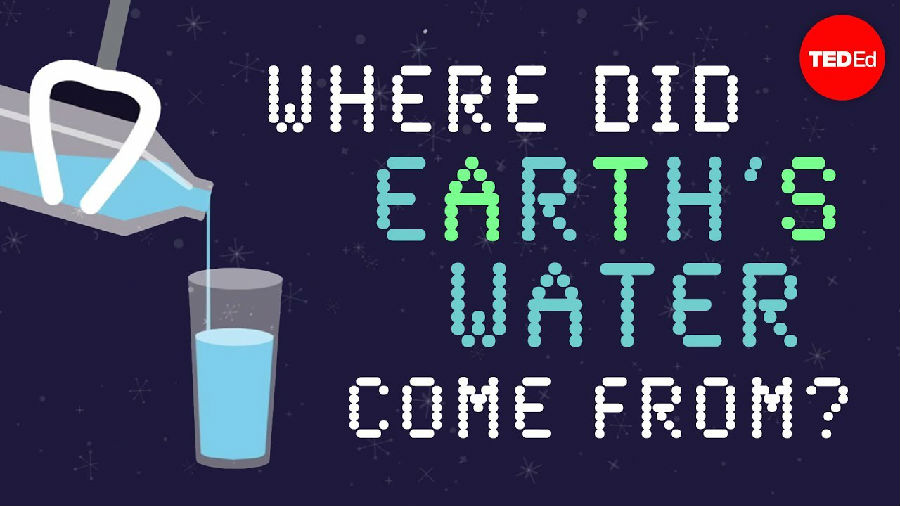(单词翻译:单击)
It has no taste, color or smell, and we often look right through it.
它没有味道、颜色或者任何气味,而且透明。
It covers over 70% of the Earth, cycling from the oceans and rivers to the clouds and back again.
它覆盖了70%的地球表面,通过海洋、河流到云层循环往复。
It even makes up about 60% of our bodies.
它甚至占到了我们身体成份的60%。
With all this water around and inside us, it's easy to take its presence for granted.
由于我们身边和体内有这么多的水,我们觉得水的存在理所当然。
But in the rest of the solar system, liquid water is almost impossible to find.
但是在太阳系的其它地方几乎找不到液态的水。
So how did our planet end up with so much of this substance and where did it come from?
那么我们的星球怎么会有如此多的这种物质,它到底来自哪里?
As you probably know, a water molecule consists of two basic parts.
就像你可能会知道的,一个水分子由两个基本部分组成。
Hydrogen, the simplest of all elements, has been around since close to the beginning of our universe.
氢原子--所有元素中最简单的元素,自宇宙诞生时就有。
Oxygen entered the scene several hundred million years later after stars began to form.
氧原子映入眼帘是在几亿年星球开始形成之后。
The massive pressure at the center of these fiery infernos was so great that hydrogen atoms fused together to form helium.
在这些炽热的如地狱般的中心,压力巨大使得氢原子聚变产生氦原子。
Helium, in turn, fused to form heavier elements, like beryllium, carbon and oxygen in a process known as nucleosynthesis.
氦原子接着聚变产生其他重原子,如铍、碳以及氧原子,这样的过程叫做核合成。
When stars eventually collapsed and exploded into supernovas,
当星球最终坍塌,爆炸形成超新星,
these new elements were spread across the universe and combined into new compounds, like the now familiar H2O.
这些元素就遍及整个宇宙,并且合成新物质,就像我们熟知的水分子。
These water molecules were present in the dusty cloud
这些水分子存在于尘云之中,
that formed our solar system and more collided with our planet after its formation.
尘云形成了我们的太阳系,并且在形成之后与我们的星球发生了更多碰撞。
But there's a big question that we don't have the answer to: how much water arrived on Earth, and when?
但是这里有一个大的疑问我们还没有对此有答案:多少水到达了地球,以及何时到达的地球?
If, as one theory goes, relatively small amounts of water were present on Earth when the rock formed,
如果按一种理论,当岩石形成之时有相对少的水到达了地球,
the high temperatures and lack of any surrounding atmosphere would have caused it to evaporate back into space.
高温以及缺少大气会导致水很快挥发回到了太空。

Water would have been unable to remain on the planet
水就不可能保存在地球上,
until hundreds of millions of years later when our first atmosphere formed through a process called outgassing.
直到亿万年之后,当我们的第一个大气层通过释气过程形成的时候。
This occurred when molten rock in the Earth's core released volcanic gasses to the surface,
这个过程发生在岩石在地核融化的时候,释放火山气体到地表,
creating a layer that could then trap escaping water.
产生了可以捕捉到逃逸水分子的一层大气。
So how then did water get back to the planet?
那么水是怎样回到地球的呢?
Scientists have long suspected that much of it was brought by ice-bearing comets,
科学家们长期怀疑大部分水来自带冰的彗星,
or more likely asteroids that bombarded the Earth over millions of years.
或者更可能来自百万年间撞击地球的小行星。
Recent research has challenged this theory.
最近的研究挑战了这个理论。
In examining carbonaceous chondrite meterorites that formed shorty after the birth of our solar system,
根据对太阳系诞生后即形成的碳质球粒陨石的化验,
scientists have found that not only did they contain water,
科学家们发现这些陨石不仅含水,
but their mineral chemical composition matched rocks on Earth and samples from an asteroid that formed at the same time as our planet.
而且它们的矿物化学成分与地球岩石以及与跟地球同时期形成的小行星的样品一致。
This suggests that the Earth may have accumulated a substantial amount of water early on that was able to stay put,
这个发现表明了地球可能在早期累积了大量的可以保留的水,
despite the lack of an atmosphere, though asteroids may have brought more over the eons.
尽管在缺乏大气的情况下,尽管小行星也许会日积月累带来更多的水。
If this turns out to be true, life may have formed much earlier than previously thought.
如果这是真的,生命可能在比之前认为的更久前的时间形成。
So we do not yet definitively know whether the water on Earth came from its initial formation,
所以我们不是确切地知道是否地球上的水来自于它最初的形式,
later impacts, or some combination of the two.
还是受后期的影响,或是两者皆有。
Regardless, the water that runs from our showers,
不管怎样,洗澡用的水、
drinking fountains and faucets is something that didn't just come from a nearby lake or river,
饮用的水以及自来水不是直接来自附近的河流湖泊,
but first underwent a cosmic and chaotic journey to get here.
而是首先经历了一个宇宙和混乱的旅途才到达了这里。


